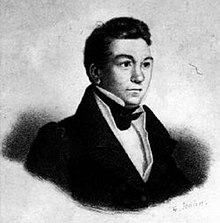
Benoit Tranquille Berbiguier (December 21, 1782 Caderousse, Vaucluse, France - January 20,1838 Pontlevoy, Loir-et-Cher, France) was a French flutist and composer.
Biography
editAt the time of his birth, Berbiguier's home town of Caderousse was part of the papal enclave Comtat Venaissin located within the Kingdom of France. The enclave was annexed by France in 1791 into its Vaucluse département[1].
In his youth, Berbiguier taught himself to play the flute, the violin and the violincello. Although destined by his family for the bar, he abruptly left his native land at age 22 and went to Paris to pursue his interest in music[2][3][4].
In October, 1805, he enrolled in the Paris Conservatory to study flute under Johann Georg Wunderlich and harmony under Henri Montan Berton. After the Conservatory, he made his living as a flutist in Paris[5][6][7]. Berbiguier is considered to be one of Wunderlich's two most celebrated pupils (the other being Jean-Louis_Tulou)[8].
In 1813, Berbiguier left Paris to avoid conscription into the military during the Napoleonic Wars. With the restoration of Bourbon King Louis XVIII in 1814, Berbiguier returned to Paris in 1815 and joined the recreated Garde du Corps (the household cavalry of the king). The court fled to Ghent in March of 1815 with the return of Napoleon from Elba. After Napoleon's defeat at the Battle of Waterloo ended the Hundred Days, the court returned to Paris , for the second restoration of the King in July, 1815. In November, Berbiguier obtained a lieutenancy in the legion of l'Ain which was organized in Bourges.[9][10]
Berbiguier became tired of the military life and wanted to return to his musical career. In 1819, he resigned from the military and returned to Paris to continue with his music. In 1823, he married a harpist named Mlle. Plou[11][12].
He remained in Paris until the July Revolution of 1830 when the Bourbon monarch King Charles X was overthrown and replaced by Louis-Philippe, the Duc d'Orléans. Because of his attachment to the elder branch of the Bourbons, Berbiguier fled Paris to avoid political trouble.[13]
He went to live in Pontlevoy, near Blois. He had a friend there named Desforges, who was a cello player for whom he had written several duets for flute and cello. Berbiguier was very distrought when his friend died in 1838. He predicted at Desforges' funeral that he would die eight days later. In fact, he did.[14]
Works
editBerbiguier composed over 200 works[15], several of which are still in print.
- Dalila (cantata, 1866)
Works Dedicated to Berbiguier
edit- Kuhlau, Friedrich, Trio for Three Flutes, No. 7, Opus 90, in b minor
Notes
edit- ^ Fetis (1866), p. 172
- ^ Grove (1890), p. 229
- ^ Barjavel (1841), p. 172
- ^ Fetis (1866), p. 172
- ^ Barjavel (1841), p. 172
- ^ Barjavel (1841), p. 172
- ^ Fetis (1866)
- ^ Fitzgibbon
- ^ Barjavel (1841), p. 172
- ^ Fetis (1866), p. 172
- ^ Barjavel (1841), p. 172
- ^ Fetis (1866), p. 172
- ^ Fetis (1866), p. 172
- ^ Fetis (1866), p. 172
- ^ Fitzgibbon (1914), page 104
References
edit- Barjavel, Casimir François Henri (1841), Dictionnaire Historique, Biographique et Bibliographique du Département de Vaucluse, Tome Premier"", Impr. de L. Devillario.
- Brown, Rachel (2002), The Early Flute: A Practical Guide, Cambridge University Press, Cambridge, 0-521-89080-2.
- Fetis, Francois-Joseph (1866), Biographhie universelle des musiciens et bibliographie generale de la Musique, Tome Premier, Tome Premier, Firmin Didot, Paris.
- De Lorenzo, Leonardo, My Complete Story of the Flute, Revised and Expanded Edition, (1992, Texas Tech University Press, Lubbick, Texas, USA)
- Fitzgibbon, Macaulay H. (1915), "The Story of the Flute, Second Edition," Charles Scribner's Sons, New York.
- Grove, Sir George, Editor (1890), A Dictionary of Music and Musicians, Volume I, Macmillan and Sons, New York.
- Maitland, J.A. Fuller, Editor (1911), Grove's Dictionary of Music and Musicians, Volume I, The Macmillan Company, New York.
- Powell, Ardal (2002), The Flute, Yale University Press, 0-300-09498-1.
- Remy, Alfred (1919), Baker's Biographical Dictionary of Musicians, Third Edition, Revised and Enlarged, G. Shirmer.
Category:1782 births
Category:1838 deaths
Category:French composers